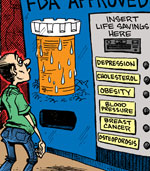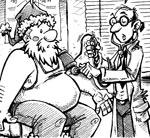What Is Insomnia's Definition for You?
| Share on Facebook | Share on Twitter | Share on Google+ |
What is insomnia? Insomnia is the repeated difficulty with getting to sleep, staying of sleep, or getting quality sleep despite having time and opportunity. The insomnia tell us that trouble getting to sleep and staying asleep is one of the most common health problems. In one study in the United States, one out of three adults reported some difficulty getting to sleep or staying asleep in the previous twelve months. Half of that group reported the problem as significant.
Insomnia May Be Chronic or Acute
Insomnia may be chronic or acute. Chronic insomnia lasts three months or more, and has little or no relationship to stress. Acute insomnia occurs in the context of identifiable stress, such as the loss of a loved one, a change in personal relationships, job loss, financial stress, weather stress, or warfare. Even in peacetime, about one in ten adults suffers acute or "adjustment" insomnia in any given year.
What Does Insomnia Mean for You?
Even when people do not get adequate sleep, they may not have a problem with feeling sleepy during the day. Even in boring, monotonous, non-stimulating situations, the absence of nighttime sleep may not result in drowsiness. However, people who manage to stay alert may feel fatigued, or having trouble concentrating. When this occurs, the underlying problem may be a condition known as hyperarousal. People who suffer hyperarousal may not be able to sleep even during daytime naps.
What Is Hyperarousal?
The underlying problem in hyperarousal is a hormone imbalance. People with this condition have higher levels of stress hormones such as cortisol, and usually have higher body temperatures both day and night. Treating hyperarousal is a matter of dealing with stress and/or modifying the body's production of stress hormones.
What Causes Chronic Insomnia?
Experts believe that however insomnia begins, whether it is a stressful event or a hormonal imbalance, insomnia becomes chronic due to psychological factors. People who have ongoing insomnia often worry about how their lives will change if they can't start getting adequate sleep. They try to get enough sleep by taking naps or sleeping in late, which makes them less likely to go to sleep at their usual bedtime.
For some people, these people with insomnia develop aversions to going to sleep. They become anxious about bedtime. They stay away from the bedroom because they fear they will only toss and turn. Or if they go to bed, they may fixate on watching the clock or checking the alarm to make sure it is set. Chronic insomnia can develop into a condition that perpetuates itself.
What Are the Health Effects of Chronic Insomnia?
People who have chronic insomnia are 9 times more likely to develop clinical depression. They are 17 times more likely to develop clinically diagnosed anxiety. Insomnia often develops before the symptoms of depression or anxiety, and only in minority of cases does insomnia develop after depression or anxiety sets in.
Can you die from insomnia? There is a condition that is most common in single males working in foreign countries causing unexplained death in sleep. This is not, however, caused by insomnia.
The kind of insomnia that can result in sudden death is sleep apnea, a condition in which breathing stops during the night. People who have sleep apnea wake up repeatedly during the night, when their breathing stops, but they do not stay awake long enough to remember the experience. Even with this potentially fatal form of insomnia, actual deaths are extremely rare.
Selected References:
Morin CM, Bootzin RR, Buysse DJ, et al. Psychological and behavioral treatment of insomnia:update of the recent evidence (1998-2004). Sleep. Nov 1 2006;29(11):1398-414
Saper CB, Chou TC, Scammell TE. The sleep switch: hypothalamic control of sleep and wakefulness. Trends Neurosci. Dec 2001;24(12):726-31.
-
Skin CareMen Skin Care
-
Free ResourcesFree eBooks
-
Half of the modern drugs could well be thrown out of the window, except that the birds might eat them.Dr. Martin Henry Fischer
-
Featured Health Supplement
 If you find a product that is as effective as Total Balance, and is better value for money, let us know and we will give you a refund equivalent to your entire purchases of Total Balance…retrospective.
If you find a product that is as effective as Total Balance, and is better value for money, let us know and we will give you a refund equivalent to your entire purchases of Total Balance…retrospective.
-



















